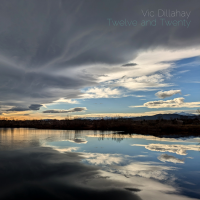Home » Jazz Articles » Catching Up With » Josiah Everhart: From YouTube Cover Artist To Confession...
Josiah Everhart: From YouTube Cover Artist To Confessional Songwriter

The whole album really is about depression and longing, which is why I called it 'Yearn in Years.'
—Josiah Everhart
After YouTube unexpectedly terminated his channel on December 18, 2019, Everhart hopes his debut full-length album, Yearn in Years (Self- released, 2020), will help him transition into streaming as a more reliable and financially sustainable way to release his music.
YouTube emailed Everhart the morning of December 18 to notify him that his YouTube channel had been terminated. Everhart appealed the decision, only for YouTube to reply hours later that his channel would remain suspended. The email—which Everhart shared on Twitter—did not explain why YouTube had terminated his channel and only provided a link to the website's community guidelines. Everhart later said he did not know why his channel was terminated, but that someone might have hacked into his account to post inflammatory comments. "I don't know, and they did not elaborate," Everhart said. "They hung me out to dry."
After Everhart, his Twitter followers, and fellow YouTubers repeatedly reached out to YouTube for further comment, the website reinstated his channel, restored his subscriber count, and reposted all of his past videos. The next day, YouTube publicly explained that the channel had been flagged for violating community guidelines and flagged videos are sometimes "mistakenly taken down."
Everhart said nothing like this incident had ever happened to him before. After uploading videos onto YouTube for years, the only problem he had experienced up to that point was when a cover of the "Green Hill Zone" theme from Sonic The Hedgehog sounded so similar to the original track that the copyright holder claimed the video's ad revenue.
Although his channel's termination reinforced what he already thought about how YouTube treats creators, Everhart said he never expected his channel to be targeted. "You can kind of see why it happens in some cases," he said, "but I don't know why it happened to me."
Everhart's covers of video game soundtracks often take tracks originally composed for '80s sound chips and reinterpret them with a mix of acoustic guitars and intimate vocals. He usually adds lyrics to instrumental pieces, crafting a heroic ballad around melodies from The Legend of Zelda and Final Fantasy or a lullaby from a Super Mario 64 tune.
Everhart taught himself musical production by making these covers and getting feedback from friends. Beyond the technical knowledge he has gained, video game soundtracks have profoundly influenced his own music, from the general mood of his songs to his choice of chords and synthesizer sounds. "My biggest influence is undoubtedly video game music."
Everhart does not rely on his YouTube channel financially and works a day job in information technology, making any income from streaming on Spotify or views on YouTube supplemental. "I think of YouTube, or I should say my music in general, as a side hustle."
In 2017, Everhart released his first collection of original music, Songs Come and Gone (Self-released), which compiled seven original tracks from YouTube onto one album. Everhart said he has learned a lot about music production since releasing that album. "I still don't really know what I'm doing, but even back when Songs Come and Gone came out, I wasn't really trying to branch out, learn more, and experiment. I've done a lot of that on the new album."
Released on January 10 of this year, Yearn in Years begins with new versions of 2017 singles. Everhart chose to remake the tracks "Dead Moons" and "Rewind" because he does not enjoy what he hears as the sterile and digital production of his older work. "I've been trying to run my stuff through different plug-ins to give it a bit more character."
While Yearn in Years uses plug-ins to achieve a more natural sound, Everhart said he plans to experiment with other ways to give his music personality, like using a reel-to-reel tape machine. "I'm not trying to go for straight up 'lo-fi' sound, but I feel like it lacks a certain kind of warmth a lot of the time," he said. "I was able to fake it with plug-ins on this album, but I'm diving further into that."
Yearn in Years began as an anthology release of all the original songs Everhart recorded in 2017. He originally intended to only write a few more songs to accompany the first versions of "Dead Moons" and "Rewind." "I kept wanting to add more songs and it kept changing and morphing until it took on a life of its own."
After originally planning to release Yearn in Years in early 2018, that spring Everhart realized that it was becoming a much larger project that an anthology, and he approached fellow YouTuber and synthwave artist Amie Waters for help. "I needed another set of ears to help me pull it all together."
Everhart and Waters worked on the album off and on for about a year and a half while he constantly wrote new songs and scrapped old ones. Some of the songs strayed from his usual melancholy and nostalgic subject matter and dove deep into science fiction, like a 10-minute track about the crew of a spaceship discovering a haunted artifact in space. "It was basically a Star Trek song," he explains. Eventually cutting the track from the album, Everhart said it would not have fit with the overall mood of Yearn in Years. "I set it aside, but I'm going to come back to that one."
One sci-fi track that stayed on Yearn in Years is "Dead Moons," a moody synth jam that introduces the album's spacey and psychedelic sound. Everhart said Waters' synths and production are responsible for the aesthetic of "Yearn in Years." "She played a big role in sculpting the sound of a lot of these songs."
Everhart notes that the original version of "Dead Moons" was a result of working on the song alone until he stopped making progress, eventually getting frustrated and giving up. When Waters added new sounds to the track, Everhart sculpted those sounds to fit his vision and they passed the track back and forth. Even tracks without the layers of Waters' synths were heavily influenced by her, Everhart said, like the acoustic penultimate track "Anyhow," which he wrote in 2011.
Everhart said the album's closer, "Without," was so heavily influenced by Waters' production that it "pretty much is an Amie Waters song." After debating cutting the song from the track list right before sending the album to be mastered, Everhart sent the song to Waters. She chopped his guitar chords into watery splashes of sound and reworked the original drum beat (by fellow YouTuber Austin Perrilloux) to sound like a drum machine. "She completely reworked the song and we saved it!"
Along with overall sound, Everhart's songwriting has changed on Yearn in Years, especially in the second half after the dreamy synth interlude "Never Hear." "I Just Want To" is darker than any of Everhart's past songs, exploring self-loathing and depression in brutally direct lyrics over easy-going bossa nova.
This contrast between dark lyrics and a happy tune speaks to the song's conflicted nature, which Everhart described as half genuine, one-fourth dark humor, and one-fourth satire of the empty self-pity in similar songs. "There's an entire genre of music out there that's like 'depression.mp3' so I'm poking fun at that by making it very blatant."
Dark lyrical themes continue in the more sincere and straightforward "Moons of Jupiter," which Everhart said he originally wrote as "just a song about my favorite planet," only to later realize he was writing about suicide. "It's almost like an end of the world song," he said. "The whole album really is about depression and longing, which is why I called it Yearn in Years."
When sharing the album with about a dozen friends before its release, Everhart said the personal and serious subject matter of tracks like "I Just Want To" and "Moons of Jupiter" made him second-guess himself. "I would give them a little disclaimer," he said. "I was like, 'The subject matter is pretty heavy.'"
Everhart said none of his friends were disturbed by the album's dark themes of depression and suicide. "I hope that it resonates with people and that it gets them out of it," says Everhart.
He already has plans for new music to follow up Yearn in Years, and he knows taking a long break to work on new music does not help artists with a small following grow their audience. "Disappearing for three years to make an album is not good," he said. "In fact, you're better off trying to release a song every month."
By the summer of 2017, Everhart had written and recorded 80 percent of the demos for a separate album, which he shelved after starting Yearn in Years. "I could just pick that back up, probably finish it fairly quickly, and have 10 or 11 songs just ready to go," he said.
For now, Everhart said he is waiting to see whether Yearn in Years will grow his audience, or if only his fans will listen to it. "I don't expect it to flop," he said. "But I don't know."
Although YouTube's temporary termination has made posting video game covers on his channel less appealing, he is not worried about the financial viability of releasing music online. He makes about 20 dollars a month from ad revenue on YouTube and gets several times that from streaming on Spotify, which he believes is becoming more pro-artist. "I think it's only going to get better," Everhart said. "Every paycheck I get from Spotify is better than the last."
Although he works a day job right now, Everhart said he hopes Yearn in Years sells well, so he can quit and go on tour. "That's what I want more than anything: the opportunity to make more music."
Collaborators and fellow YouTube musicians like guitarist Richard Bichler and drummer Austin Perrilloux have already told Everhart they are willing to go on tour with him. "And I'm like, 'I gotta make it happen!'"
Tags
Catching Up With
Josiah Everhart
John Bricker
United States
Oregon
Amie Waters
Richard Bichler
Austin Perrilloux
PREVIOUS / NEXT
Support All About Jazz
 All About Jazz has been a pillar of jazz since 1995, championing it as an art form and, more importantly, supporting the musicians who make it. Our enduring commitment has made "AAJ" one of the most culturally important websites of its kind, read by hundreds of thousands of fans, musicians and industry figures every month.
All About Jazz has been a pillar of jazz since 1995, championing it as an art form and, more importantly, supporting the musicians who make it. Our enduring commitment has made "AAJ" one of the most culturally important websites of its kind, read by hundreds of thousands of fans, musicians and industry figures every month.


























